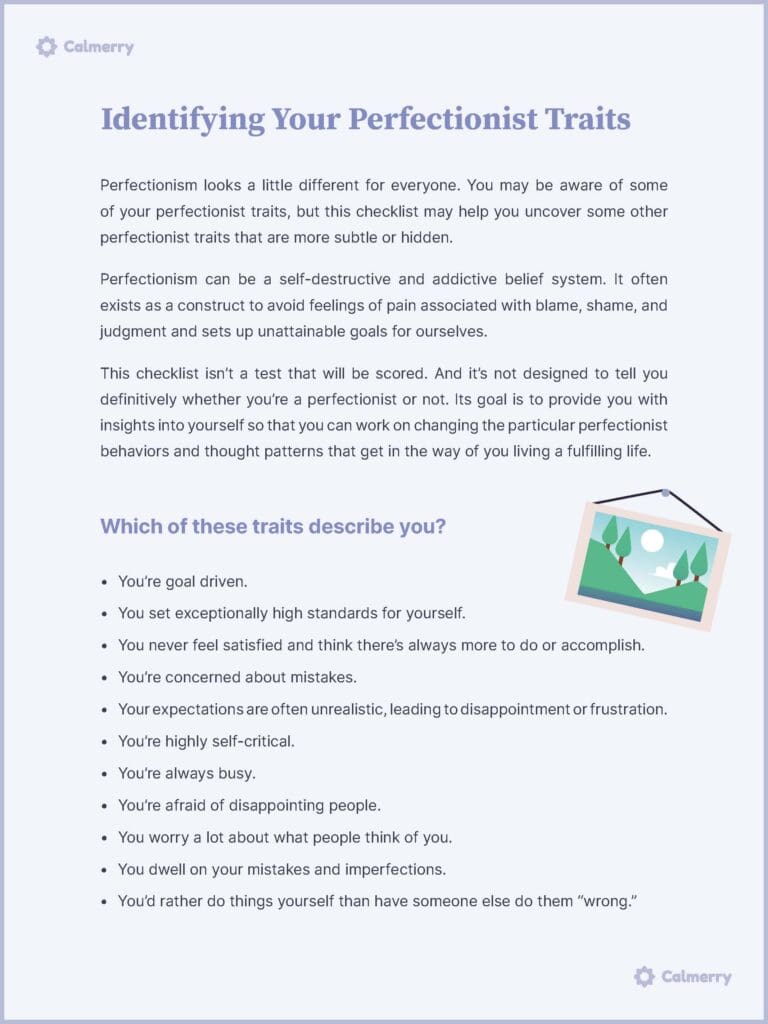You’re Enough: 10 Ways to Stop Feeling Inadequate

In this article
Do you often compare yourself to others and feel you never measure up? Do you constantly worry that you’re not doing things perfectly? Are you disappointed with yourself when you find your knowledge gaps? Do you experience shame for not being okay?
In our fast-paced, highly competitive world that strives for perfection, it’s easy to feel like you’re not good enough.
The truth is, we all have moments when we feel inadequate – that’s part of being human. But for many people, inadequacy is a constant, overpowering struggle. Many are battling with feeling like they’re just not cut out for this life.
If that’s the case for you, you’re not alone. And you have the power to change how you feel about yourself. In this post, we’ve outlined 10 ways that you can work on building up your self-confidence, beating self-doubt, and overcoming a feeling of inadequacy.
What does a sense of inadequacy feel like?
That “not enough” feeling can chase you in any life facet and come in many forms: you may feel like you’re not smart enough, successful enough, healthy enough, or attractive enough… But whatever part of your Self it affects, the feelings of inadequacy can be paralyzing and harmful to your mental health.
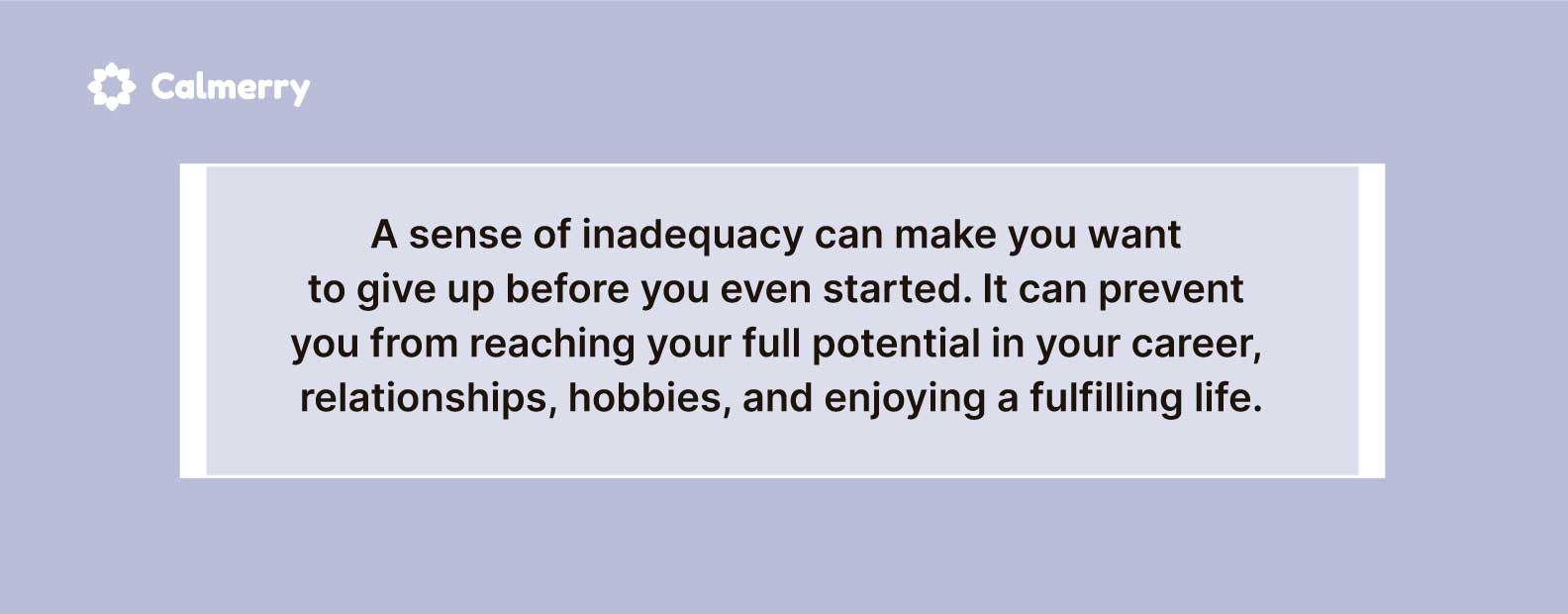
To be more exact, inadequacy issues often create many emotional and psychological challenges. You may feel:
- Powerless or unable to deal with difficult situations
- Scared to take risks and meet new opportunities
- Constantly ashamed of yourself
- Not aligned with your true self
- Negative and unhappy
- Socially withdrawn or isolated
- Angry or hostile
- Overly jealous
- Incompetent
- Unmotivated
- Depressed
- Uncertain
- Worthless
- Insecure
- Useless
- Anxious
- Guilty
You may also experience a fear of criticism or judgment, of rejection, or of ridicule. And as a way of avoiding difficult emotions, you may develop unhealthy coping mechanisms such as overeating or projecting your complex feelings onto others.
Also, a sense of insufficiency usually manifests itself as a symptom of imposter syndrome.
Generally, inadequacy may be a minor issue for some and a very painful and alienating experience for others. And if you can relate, you probably noticed that it can stand in your way of living life to the fullest and embracing all amazing sides of yourself.
Some possible reasons behind your feeling of inadequacy

It’s also worth noting that negative opinions about ourselves are often situation-based. We all can start feeling a little shaky at some point in our lives. But for some of us, it’s a set of deep-rooted and internalized inaccurate beliefs about ourselves that could develop from childhood.
Acknowledging them is one of the first steps in overcoming a feeling of inadequacy.
Let’s check out some of the causes and contributing factors:
- Having overcritical parents or neglecting caregivers
- Not being praised for your efforts and accomplishments or being judged for them
- Going through bullying at school, in the workplace, or in peer groups
- Being affected by negative social comparison
- Being a perfectionist
- Facing prescribed rules, messages in the prevailing culture, gender norms, or social trends that literally tell you about certain ways you must behave and build your life
- Being in codependent relationships
- Being in abusive relationships
- Being exposed to stressful or traumatic events that evoked complex emotions and affected your self-esteem
- Not living the life you truly desire
- Experiencing a lack of self-awareness
- Having cognitive biases (such as negativity bias or the Dunning-Kruger effect that goes from the lack of insight and reflection on your own abilities).
A sense of insufficiency and worthlessness can also stem from mood disorders such as depression being one of the key symptoms.
Exploring the reasons for your feeling of inadequacy and examining distortions in your thinking about yourself can be a lonely journey. Fortunately, therapy provides a safe and non-judgmental space for better understanding your reactions and emotions.
If you’re seeking support, speaking to a therapist online is a convenient and effective way to connect with a professional who can help uncover the causes, give insights into why you feel the way you feel, and address the underlying problems to start building your healthy sense of self.
Find your true self and stop feeling inadequate with these 10 steps
Becoming your own biggest fan doesn’t happen in a split second. Changing negative self-perception and embracing more positive and confident thinking about yourself is an exciting journey that takes time and effort. But it’s always immensely rewarding!
These 10 ways can help you start feeling better about yourself and your place in the world:
1. Acknowledge your difficult feelings
Healing the parts of us that feel inadequate is a process. It starts with recognizing them and naming the associated feelings and emotions.
Although these inner experiences may be difficult and confusing, try not to push them away or pretend they don’t exist. Instead, acknowledge them without judgment and allow yourself to experience them fully.
This can be a really unpleasant or painful process. However, it’s an essential step in understanding what sides of your Self require more warmth and compassion for inadequacy to dissolve gradually.
2. Let go of unhelpful comparisons and set your own standards

Often, the feelings of inadequacy are the result of negative comparison-thinking. We are all prone to comparisons as a self-evaluation tool. But too often, while comparing ourselves to others, we feel like we come up short and can never measure up to the standards set by others – or by our own internal critic.
There’s always someone who seems to have it all together: they’re more successful, smart, happy, and always seem to be one step ahead. And we start focusing on what we perceive to be lacking in ourselves. This can leave us feeling stuck, unable to move forward.
But the truth is, we are all on our own unique journeys – with our own sets of challenges and struggles. Other people’s experiences cannot always be used as a measuring stick for our lives. After all, we are the only ones who know what it’s like to walk in our shoes.
That’s why it’s advisable to focus more on your own path and on living up to your standards. By letting go of unhelpful comparisons, you will start discovering your self-worth and being more confident in who you are.
Therapy can greatly help in using comparison productively. With a mental health professional, you’ll learn how to cope with a paralyzing feeling of failure and explore the full joy of life activities, relationships, and careers and how to get the most out of them.
3. Identify your strengths and assets
Recognizing your strengths and exploring new ways how you can use them in life improves your self-esteem and builds up your self-confidence.
And the process of getting to know your best self isn’t limited only to listing your great and easily recognized strengths. Some of your assets may naturally go unnoticed because they may seem ordinary to you or feel “nothing special since all my friends have them.” Actually, everything counts.
Think about what you’re good at. Are you a good listener? A good problem solver? A good friend? A good cook? Any strength of you is something to be proud of and use as a growth point. So include all your positive sides on the list, no matter how big or small they are.
To make the process of self-exploration easier for you, we’ve prepared this worksheet. Circle your strengths from the options below or add some at the bottom.
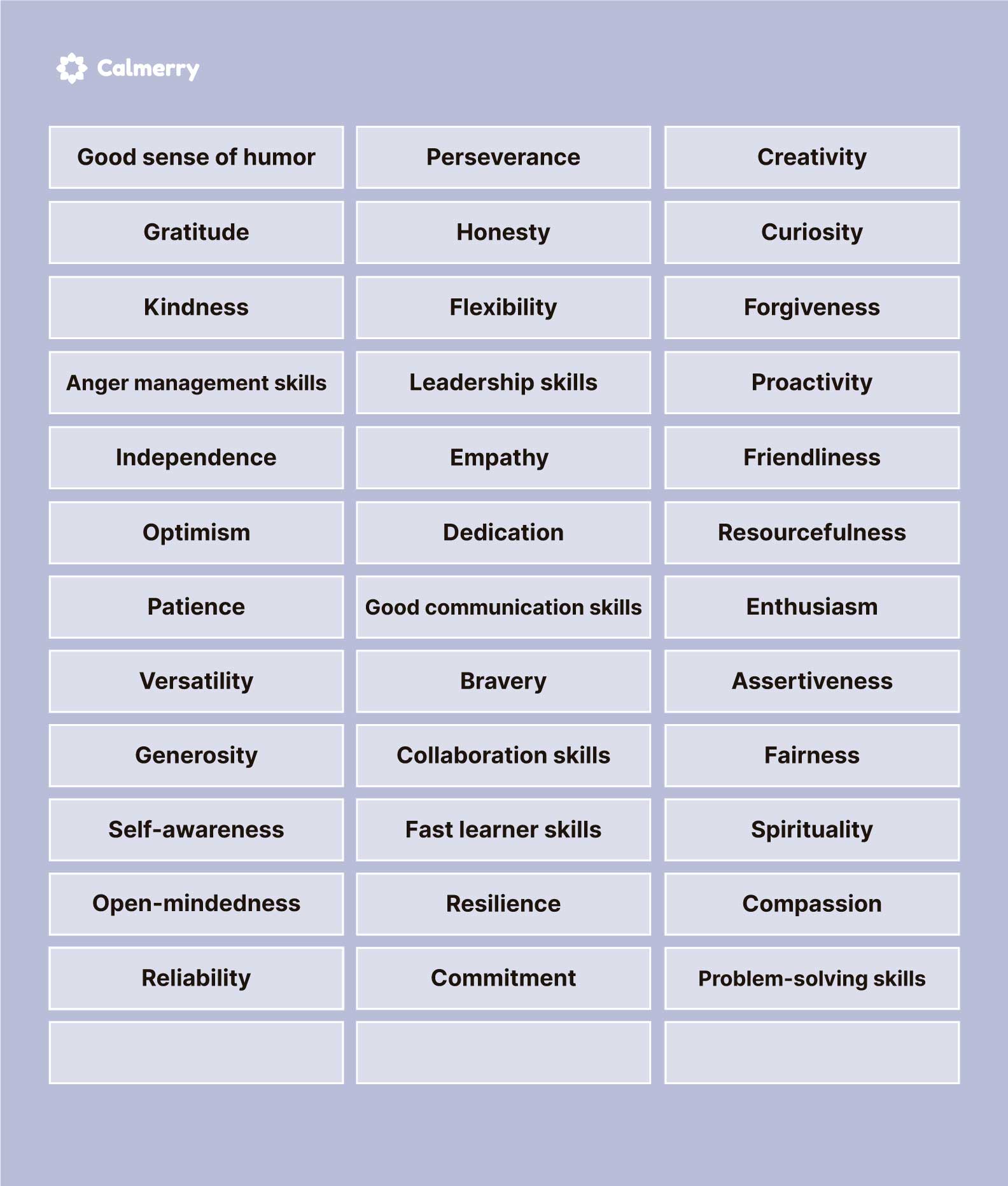
4. Keep growing
We’ve all been in situations when challenges exceed our skills and resources to cope with them and succeed. And that is perfectly okay! Rome wasn’t built in a day, so no person is good at everything right away.
Although insufficiency often feels disappointing, don’t let setbacks stop you or define your self-worth – keep moving by cultivating a growth mindset, as introduced by Dr. Dweck.
Keep learning new things, developing new skills, and expanding your knowledge. And don’t be afraid to make mistakes – mistakes are how we learn and grow.
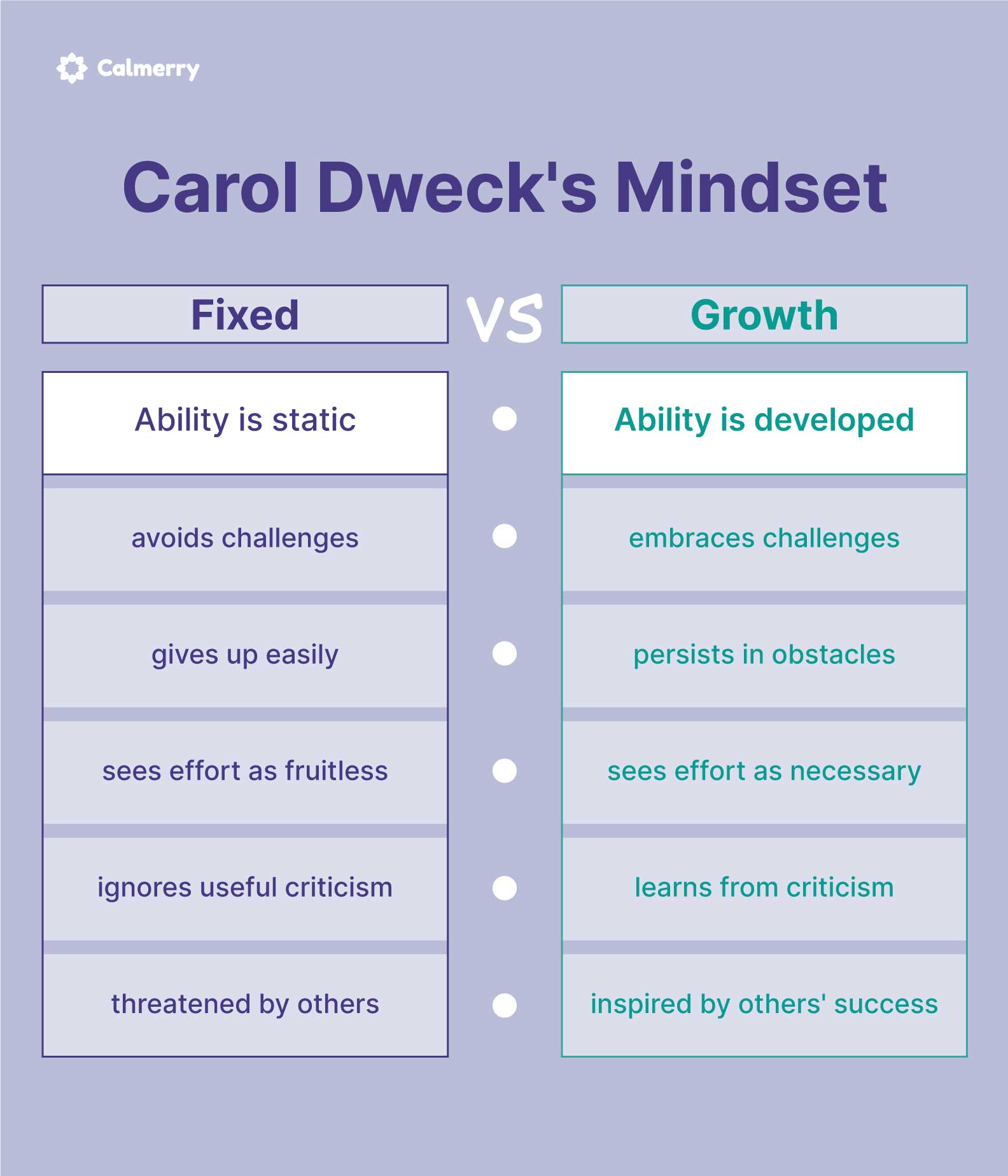
As long as you keep growing at your comfortable pace, you’ll eventually feel more confident in those parts that feel insufficient for now.
5. Give yourself permission to be imperfect
Why do we find it so difficult to give ourselves permission to be imperfect? It’s as if we believe that if we’re not perfect, we’re somehow deficient or lacking. Perfectionism indeed can be a cause of unhappiness and self-dissatisfaction.
When you strive for perfection, you become paralyzed by fear of making mistakes. And you may miss out on opportunities to learn and grow.
While you might already be aware of some of your perfectionist tendencies, this Identifying perfectionist traits checklist can help you uncover other, more subtle traits you may not have noticed before.
Its purpose is to provide you with valuable insights into yourself, enabling you to work on changing specific perfectionistic behaviors and thought patterns that get in the way of you living a fulfilling life.
Moreover, being an overly self-critical perfectionist who’s bullying yourself for every slip is somehow like being in an abusive relationship – with yourself. And we all know that leaving them isn’t as easy as it may seem. But remember that no one knows everything, and no one is almighty.
All in all, life is not about being perfect – it’s about being authentic. And when you give yourself permission to be imperfect, you allow yourself to be real and happy with your true self.
So, self-acceptance is your superpower. Try these daily affirmations to help yourself nurture it:

6. Give yourself credit where credit is due
Too often, we put our own accomplishments on the back burner while focusing on the negative. This can lead to feelings of low self-worth and discouragement.
Instead, try taking a moment to celebrate your success, no matter how big or small it may seem. Have you landed a dream job? Have you mastered a new recipe recently? Well done!
Pause to mindfully reflect on how your accomplishments feel in your body. If you want to straighten your back, or you feel joy, pride, and gratitude, stay with these positive sensations for a while. This will help to notice them more frequently, tame inadequacy, and increase your confidence and motivation.
Also, it’s important to congratulate yourself for making progress, even if you haven’t yet reached your goals. An effort is what matters.
7. Practice positive self-talk
“My life has been filled with terrible misfortune, most of which never happened.” – Michel de Montaigne
We all have an inner voice that naturally speaks to us throughout the day. This voice can be either positive or negative and have a tremendous impact on our overall mood and self-perception. As an example, negative self-talk can fuel your feelings of not being enough.
However, your thoughts are not facts. Just because you think badly of yourself doesn’t make it true. And one of the helpful things you can do for yourself to stop feeling inadequate is to practice positive self-talk.
Whenever you think or say something negative about yourself, take a step back, observe your thoughts, and shift the inner dialogue.
For example, instead of thinking, “I’m such a mess,” try saying more self-compassionate, “I’m doing the best I can.” Or instead of berating yourself for making a mistake, remind yourself that everyone makes mistakes and that you’re learning and growing from them.
It’s also worth noting that reframing negative thoughts isn’t that easy to do right away. The process of changing a deep-seated habit requires patience and finding the wise balance between unrealistic negativity and toxic positivity. So check out these 7 techniques to sidestep negative thinking patterns shared by Kate Dubé, LCSW.
8. Practice self-compassion
One of the best ways to overcome feelings of inadequacy is to be kind and understanding towards yourself. Whether you are struggling with a difficult situation, dealing with disappointment, feeling not your best, or facing an obstacle, recognize that these struggles are normal. Everyone experiences tough times at some point in their lives.
Try not to judge yourself harshly for any struggles you may be facing. Also, give up on rumination on past mistakes and beating yourself up for any failure.
Instead, acknowledge your difficult feelings and reflect on how your reactions might be rooted in past experiences or childhood beliefs. Provide that “insufficient” part of yourself with compassion as you would do to your best friend.
By giving yourself the understanding and support you need during challenging times, you can begin to feel more confident in yourself and your abilities.
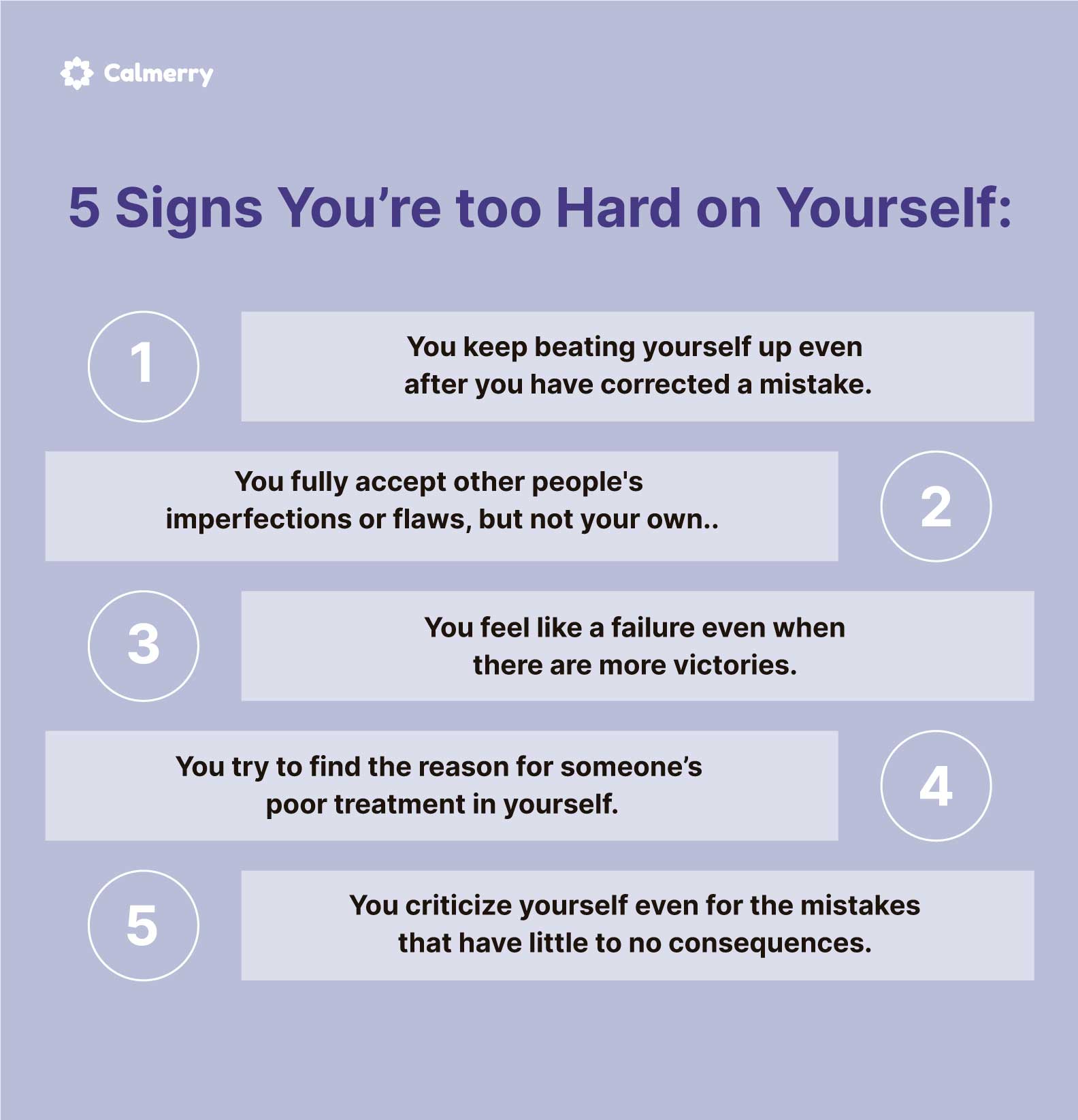
9. Set realistic goals for yourself
To combat feelings of inadequacy and insecurity, it’s helpful to set realistic goals for yourself, considering your abilities and skills rather than solely focusing on what you wish you could accomplish.
When we try to push ourselves or set unattainable standards, we are more likely to become discouraged when things don’t work out exactly as planned – resulting in increased feelings of failure or inadequacy. Instead, a better approach would be to:
- Focus on setting achievable goals that challenge but don’t overwhelm you and
- Lower your expectations to fit the challenges you face.
This way, even if you don’t achieve every goal 100% perfectly, you still win! And remember, the journey is just as important as the destination. So don’t forget to enjoy the process and celebrate your small victories along the way.
10. Get professional support and insights
Inadequacy can rob you of your joy, self-confidence, fulfillment, and motivation in life. It can cause you to doubt your abilities and feel like you’re constantly not good enough. And coping with it alone – be it in the form of situational feelings or internalized negative beliefs – is usually challenging.
So seeking professional support to work through inadequacy issues can be a good option. And it’s definitely a courageous step towards discovering the best version of yourself.
A Calmerry therapist can help you understand the root cause of unhelpful thought patterns driving your feelings of inadequacy. They can provide tools and perspectives to help you shift your thinking and start to feel more confident.
With time and effort, you can learn to manage your feelings of insufficiency and live a life that is more fulfilling and satisfying – the life you truly deserve!
online therapy
live video session
